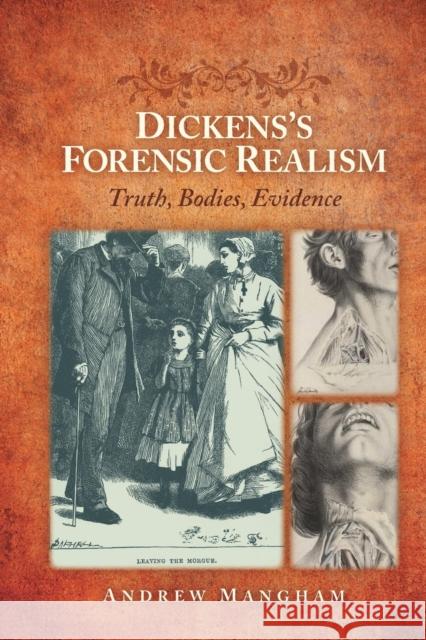Dickens's Forensic Realism: Truth, Bodies, Evidence » książka
topmenu
Dickens's Forensic Realism: Truth, Bodies, Evidence
ISBN-13: 9780814253861 / Angielski / Miękka / 2018 / 272 str.
Dickens's Forensic Realism: Truth, Bodies, Evidence by Andrew Mangham is one of the first studies to bring the medical humanities to bear on the work of Dickens. Turning to the field of forensic medicine (or medical jurisprudence), Mangham uncovers legal and medical contexts for Dickens's ideas that result in new readings of novels, short stories, and journalism by this major Victorian author. Dickens's Forensic Realism argues that the rich and unstable nature of truth and representation in Dickens owes much to the ideas and strategies of a forensic Victorian age, obsessed with questioning the relationship between clues and truths, evidences and answers.
As Mangham shows, forensic medicine grew out of a perceived need to understand things with accuracy, leaning in part on the range of objectivities that inspired the inorganic sciences. At the same time, it had the burden of assisting the law in convicting the guilty and in exonerating the innocent. Practitioners of forensic medicine were uniquely mindful of unwanted variables such as human error and the vagaries of interpretation. In readings of Oliver Twist, Our Mutual Friend, Bleak House, The Pickwick Papers, Great Expectations, and Dickens's early journalism, Mangham demonstrates that these questions about signification, perception, and reality are central to the stylistic complexities and playful tone often associated with Dickens. Moreover, the medico-legal context of Dickens's fiction illuminates the richness and profundity, style and impact of Dicken's narratives.Dickenss Forensic Realism: Truth, Bodies, Evidence by Andrew Mangham is one of the first studies to bring the medical humanities to bear on the work of Dickens. Turning to the field of forensic medicine (or medical jurisprudence), Mangham uncovers legal and medical contexts for Dickenss ideas that result in new readings of novels, short stories, and journalism by this major Victorian author. Dickenss Forensic Realism argues that the rich and unstable nature of truth and representation in Dickens owes much to the ideas and strategies of a forensic Victorian age, obsessed with questioning the relationship between clues and truths, evidences and answers.
As Mangham shows, forensic medicine grew out of a perceived need to understand things with accuracy, leaning in part on the range of objectivities that inspired the inorganic sciences. At the same time, it had the burden of assisting the law in convicting the guilty and in exonerating the innocent. Practitioners of forensic medicine were uniquely mindful of unwanted variables such as human error and the vagaries of interpretation. In readings of Oliver Twist, Our Mutual Friend, Bleak House, The Pickwick Papers, Great Expectations, and Dickenss early journalism, Mangham demonstrates that these questions about signification, perception, and reality are central to the stylistic complexities and playful tone often associated with Dickens. Moreover, the medico-legal context of Dickenss fiction illuminates the richness and profundity, style and impact of Dickens narratives.
As Mangham shows, forensic medicine grew out of a perceived need to understand things with accuracy, leaning in part on the range of objectivities that inspired the inorganic sciences. At the same time, it had the burden of assisting the law in convicting the guilty and in exonerating the innocent. Practitioners of forensic medicine were uniquely mindful of unwanted variables such as human error and the vagaries of interpretation. In readings of Oliver Twist, Our Mutual Friend, Bleak House, The Pickwick Papers, Great Expectations, and Dickenss early journalism, Mangham demonstrates that these questions about signification, perception, and reality are central to the stylistic complexities and playful tone often associated with Dickens. Moreover, the medico-legal context of Dickenss fiction illuminates the richness and profundity, style and impact of Dickens narratives.











